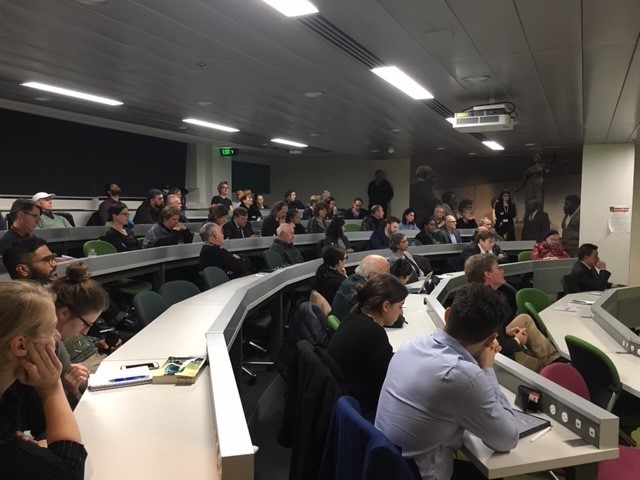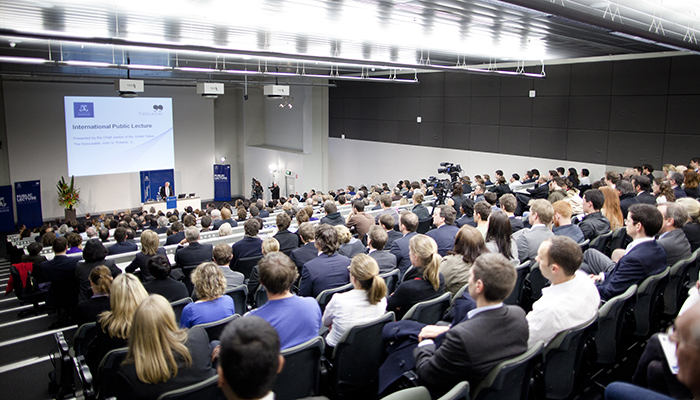2019

The Two University Freedoms: Academic Freedom and Freedom of Speech
Professor Adrienne Stone
10 September 2019
Two concepts are much bandied about in contemporary public debate about universities: academic freedom and freedom of speech. Almost everyone agrees that they are very important but opinions differ wildly as to what these two freedoms require. In this lecture, Professor Stone argues that two freedoms are quite distinct: academic freedom springs from the university’s mission to advance and disseminate knowledge, whereas freedom of speech is important because universities are also institutions of civil society.
Professor Stone argues for the primacy of the university’s teaching and research mission. Teaching and research are ordinarily enhanced by a strong and vibrant public debate and culture of freedom of speech. However, where freedom of speech undermines or disregards academic standards and values, freedom of speech should give way.
Presented as part of Social Sciences Week Australia by the Academy Of The Social Sciences In Australia and the University Of Melbourne.
Engineers: the drama of its day in the climate of its era
The Hon. Justice Stephen Gageler AC
25 July 2019
Who were the heroes of the Engineers’ Case? In this public lecture, Justice Gageler reflects on the people behind the landmark decision. There was the young Robert Menzies, counsel for the successful party, who was permitted by the High Court to challenge its earlier decisions. There was Frank Leverrier KC, who appeared for the Commonwealth and ably supported Menzies’s argument. Most prominently, there was Samuel Griffith and Isaac Isaacs, who stood on either side of a debate about the federal compact that culminated in the Court’s decision. But Griffith and Isaacs were as committed to the resolution of their debate by an Australian High Court as they were to their own views. By the time of the decision, Griffith had foreseen the need for old doctrines to be revised, and the new era of post-war Australia provided the conditions for Isaacs’s view to prevail over Griffith’s.
The Future of Law Reform: Constitutional and Immigration Issues
Professor Matthew Harding and Justice John Middleton
18 June 2019
An interactive evening discussing law reform priorities with the potential to shape the future of Australian law.
The Australian Law Reform Commission and the University of Melbourne Law School are pleased to present a panel discussion on the future of legal and constitutional reform in Australia. The discussion progresses the ALRC’s new project seeking public input to assist in identifying areas of Australian law which may benefit from reform. The project generally will be broad‐ranging and will consider suggestions relating to any area of law. However, this panel event will focus on issues relating to the Australian Constitution, and also Immigration. The ALRC has identified a common theme in previous ALRC inquiries that the Australian Constitution has frequently presented challenges for the effective functioning of the legal system, or has constrained options for law reform. There is also significant concern with the unwieldy nature of the immigration legal framework – the Migration Act is one of the largest pieces of Commonwealth legislation, and has been amended frequently. Expert speakers at this event will explore aspects of each of constitutional law and immigration law that may be ripe for future reform. Panel members include Professor Cheryl Saunders, Professor Adrienne Stone, Professor Susan Kneebone, and Human Rights Law Centre Legal Director Katie Robertson. Discussions and suggestions made at the event will be considered by the ALRC in developing a proposed multi‐year programme of law reform inquiries for the consideration of the Commonwealth Attorney‐General.

The Office of the Commonwealth Ombudsman: Four Decades On
30 April 2019
In this special CCCS seminar, the 10th and current Commonwealth Ombudsman, Mr Michael Manthorpe will engage in a conversation with Associate Professor Kristen Rundle on ‘The Office of the Commonwealth Ombudsman: Four Decades On’.
The dialogue between the Ombudsman and Associate Professor Rundle will be structured around three broad themes – ‘From History to the Present’, ‘Environment’, and ‘Relationships’ – designed to invite discussion of such questions as how the purpose of the office of the Ombudsman has developed over time, how changes in the delivery of government services have affected the role of the Ombudsman, and the capacity of the office of the Ombudsman to adapt to changes in its relationships with citizens, media, and entities of government.

The next long wave of reform - where will the ideas come from?
Terry Moran AC
25 March 2019
The Jim Carlton Annual Integrity Lecture is jointly hosted by the Centre for Comparative Constitutional Studies (CCCS) at Melbourne Law School and the Accountability Round Table (ART).
Terry Moran AC speaks to the period of Australian national development after World War II and the acceptance of macro- and micro-economics as the source of policy ideas from the early 1980s that led to the conversion of the Australian Public Service (APS) to economics as an ideology. He will address the public’s eventual disenchantment with what this period has delivered before suggesting ideas for reform of the APS to ensure it is fit for the emerging challenges we face.